Table of Contents Show
The time has finally come. You’ve just reached retirement and are ready to relax and travel, so why not buy an RV and hit the open road? You feel like you’re living the dream–until you get two months down the road and stuck in the middle of nowhere with significant repairs to deal with. Suddenly, you start to wonder if RVing really is everything you imagined.
While many retirees love RVing, you shouldn’t go into it with your eyes closed. Keep reading to find out the downsides of RVing and determine if it should be one of your goals in retirement.
Think You Won’t Regret an RV in Retirement? You Might Want to Think Again
It’s nice to think that traveling the world is the best option when you travel, but make sure you know what’s coming. We’ve compiled 15 reasons that you might regret RVing in retirement.

1. RVs Are Expensive
An RV is an expensive investment that depreciates just as fast, if not faster, than a car. You can expect a brand new RV to depreciate approximately 30% when you drive it off the dealer’s lot.
As you might expect, larger or higher-quality RV brands come with higher price tags. Motorhomes and fifth wheels are typically more expensive than travel trailers, which are more expensive than teardrops and pop-ups.
So if you’re concerned about expenses but still want to give RVing a try, start with something like a small travel trailer. You can find a good, new travel trailer for under $20K.
Just remember you also need something to tow it. Trucks can majorly ramp up your costs.
2. RVing Is Expensive
RVing costs add up quickly. Once you purchase your RV, you’ll need gear. Camping chairs, tire chocks, and more add up quickly. And no matter your warranty or lack of one, there are always maintenance issues. Remember, you’re driving that RV at highway speeds. That’s like putting it through a hurricane over and over again.
Then there are campground costs. Again, depending on how and where you plan to stay, campgrounds can cost anywhere from $35 to $100 per night. Or more if you’re planning on staying in luxury RV resorts near a body of water.
There are ways around high nightly costs, such as buying a membership to a group of campgrounds like Thousand Trails. But there are upfront costs and annual dues.
If you get creative, you can save money and try boondocking. If you plan to stay in a location for a month or a season, some campgrounds offer discounts for more extended stays.
3. RV Depreciation Is Ridiculous
RVs depreciate fast. Larger RVs like fifth wheels, class A, and class C motorhomes tend to have a quicker depreciation rate than travel trailers and class Bs. Like we said earlier, an RV is likely to lose 30% of its value as soon as it’s driven off the lot.
On top of the initial depreciation, class A motorhomes can lose another 30% in their first three years. Plus, a class C may drop 38% in value after five years and a fifth wheel 45%. Ouch!
Class B motorhomes and camper vans hold their value the best. If you plan to RV in retirement, they may be a wise option. However, they can run between $150K to $200K for a new model.
4. Health Care Is Hard on the Road
Health care is a reality for us all. But it can be particularly tricky for retirees traveling in different states.
Depending on your health insurance, you may not be covered if you need to see a doctor in a state other than the one where you have residency.
If you plan to travel between only two states per year, you may be in luck. Some Medicare plans have snowbird coverage.
There are also national health insurance plans, but they don’t necessarily cover everything. So always read the fine print and review the plan with someone at the insurance agency.
5. RVs Can Be Difficult to Learn to Drive or Tow
For someone who hasn’t driven an RV or towed one, it might be a challenge at first. However, if you attempt an RV road trip without lessons or practice, you could put yourself and others in danger.
We highly recommend learning how to drive the RV you purchase before your first camping trip. If you know an experienced RVer, perhaps they could give you lessons. But there’s nothing better than a professional, like the RV Driving School that provides lessons across the country. Plus, they teach you in your own RV.
6. Campgrounds Are Crowded
With more and more people RVing, campgrounds are crowded, particularly during peak seasons. Nearly everywhere is bursting at the seams in the summer when schools are on break, and the southern states are extremely busy in the winter.
It’s essential to book campground reservations in advance. Sometimes, you’ll want to make winter reservations at least a year out. For example, many beachfront RV parks in Florida are so popular you can’t get in unless you book at least 12 months before your trip!
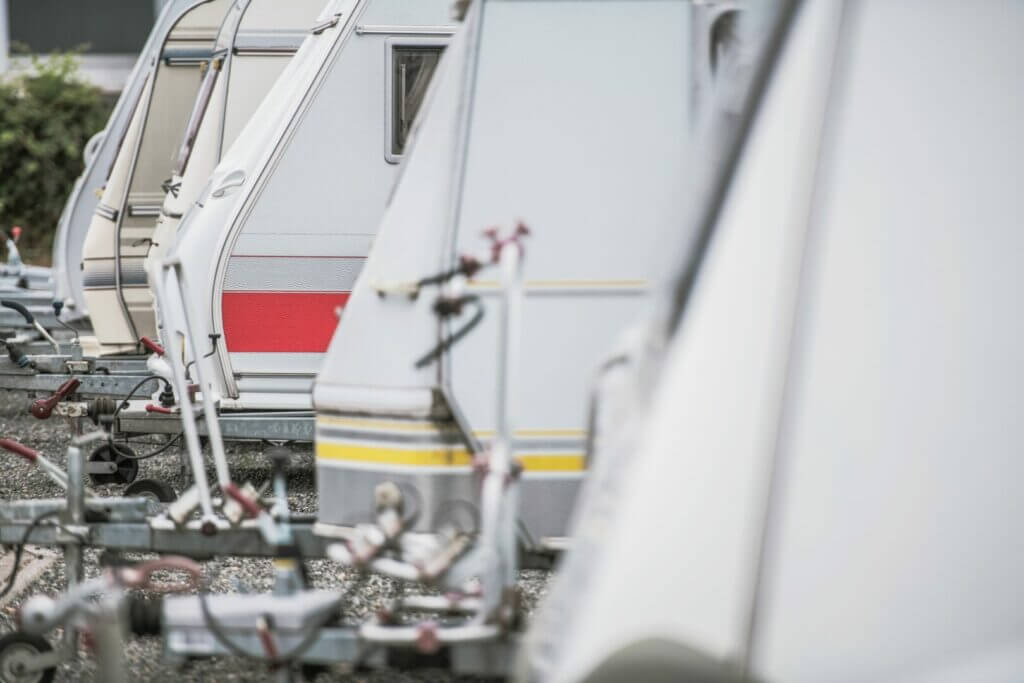
7. RV Repairs and Warranty Work Take Forever
Something on your RV will break–it’s inevitable! And when it does, RV repairs and warranty work can take days at best and months at worst. With more RVs on the road than ever before, service centers are busy.
If you purchase an RV with a warranty, ask the dealer where you can get warranty work done. Often, you’re restricted to their dealership or a few others throughout the country.
For repairs not under warranty, you may have a chance of faster service. However, depending on what you need to do, it may take a while for parts to ship. So you should expect delays. You could end up in a hotel for a while.
On the bright side, if you’re handy, you could do your own repairs. You’ll still have to pay for parts and wait for them to arrive, but it would cut out labor expenses and wait times.
No matter your circumstances, staying up to date on your general RV maintenance will decrease your chances of significant mechanical errors.
8. It’s a Small Space
An RV is a small space. If you’ve lived in a 2,000 sq. ft home for most of your life, a 30ft motorhome will be an adjustment. Your first few months of retirement in an RV might be rough. If there are two of you in the RV, you’ll need to figure out your rhythm.
Downsizing and living minimally can also be freeing. You may find a lot of joy in not having to clean multiple bathrooms or a large kitchen. If you go in knowing there’s going to be an adjustment period, you can likely work around the space issues.
Pro Tip: Are you sure the RV lifestyle is for you? Read 5 Worst Things About Full-Time RV Living to see if you can handle the worst!
9. Finding Overnight Parking Can Be Difficult
Overnight parking in places like Walmart or Cracker Barrel is getting more complicated, thanks to the increased number of RVs on the road. Also, places like Cabelas are starting to discontinue their RV parking.
There are still spots to be discovered, however. You may just need to be creative and plan more than usual. You could also work on being fully self-sustainable so that you can boondock on Bureau of Land Management (BLM) lands.
Harvest Hosts is also a great overnight option, but it does come with an annual fee and the expectation of purchasing something at the place you park.
10. RVing Can Be Exhausting
RVing isn’t as easy as staying in a hotel where someone washes your towels and makes your bed. You do all the cleaning, maintenance, cooking, and washing in your “hotel” on wheels. Plus, you have to drive, trip plan, book campgrounds, and navigate your mail, among other things, while on the road. It sounds less and less like a vacation, doesn’t it?
Ultimately, RVing can be exhausting, so we recommend working in “rules” to help keep your energy up. Perhaps you decide that driving up to 200 miles a day and staying for at least two nights somewhere keeps you from exhaustion. It’s helpful to figure out what works for you and stick with it.
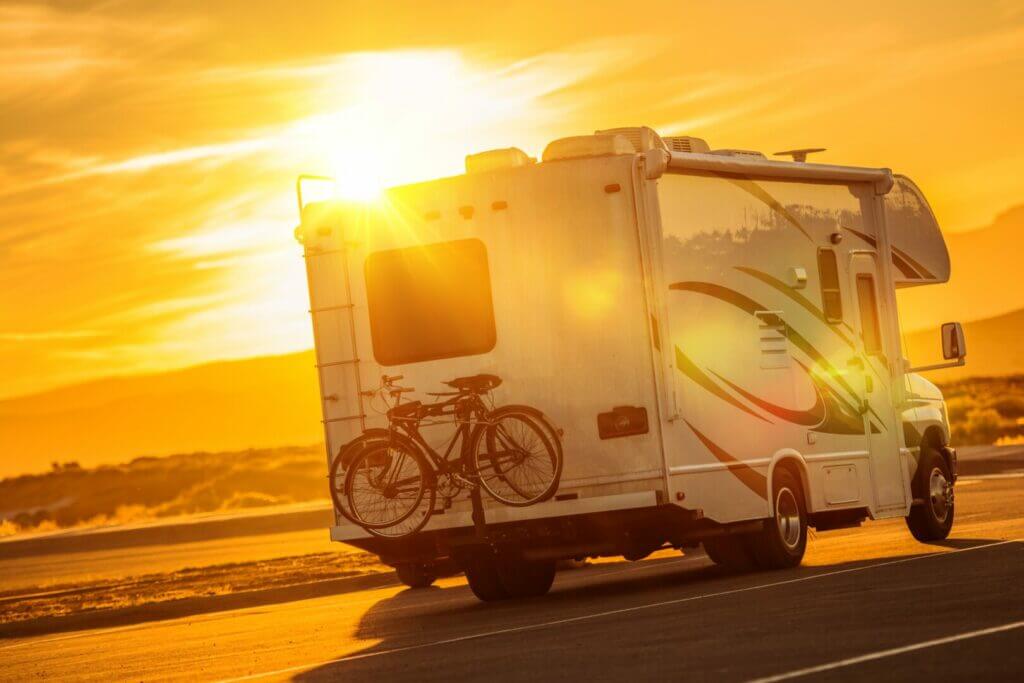
11. You Can’t Take Everything with You
Remember, an RV is a small space with both storage and weight limitations, so you can only take so much with you.
When purchasing an RV, keep in mind what you want to take with you and what you need. Make a list and take it with you while RV shopping. You can then determine if the RV you want actually meets your requirements.
12. There’s a Big Learning Curve
There’s a big learning curve from driving or towing an RV to navigating all the hoses and hookups. Even if you have a luxury motorhome with automatic everything, there’s still a lot to take in.
Proceed with caution and go easy on yourself. There will be multiple ups and downs with RVing, especially in your first few months. After a while, you’ll likely get comfortable with it all. We encourage you to ask for help when you need it. If you’re in a campground, RVers typically love to help other RVers.
13. Three Words: the Black Tank
Yes, the black tank is gross. But you have to empty it, and you can learn to do so without spillage. This is one of the not-so-fun jobs of RVing.
There are plenty of Youtube videos out there to walk you through how to dump your black tank safely. Soon enough, you’ll feel confident enough in the process that it’s no longer intimidating.
14. RVing Can Feel Lonely and Isolating
Retirement is a big transition on its own, and adding RVing into the mix can unknowingly lead to loneliness or isolation. You’ll likely be leaving your family and friends in your hometown as well as your daily routines. The RV life brings on a new set of patterns and friends, but that doesn’t mean loneliness won’t creep in.
There are plenty of ways to meet others while RVing. Campgrounds often have activities. Or a simple walk through the park could lead you to meet others who RV in retirement. You can also join groups online and arrange in-person meetups.
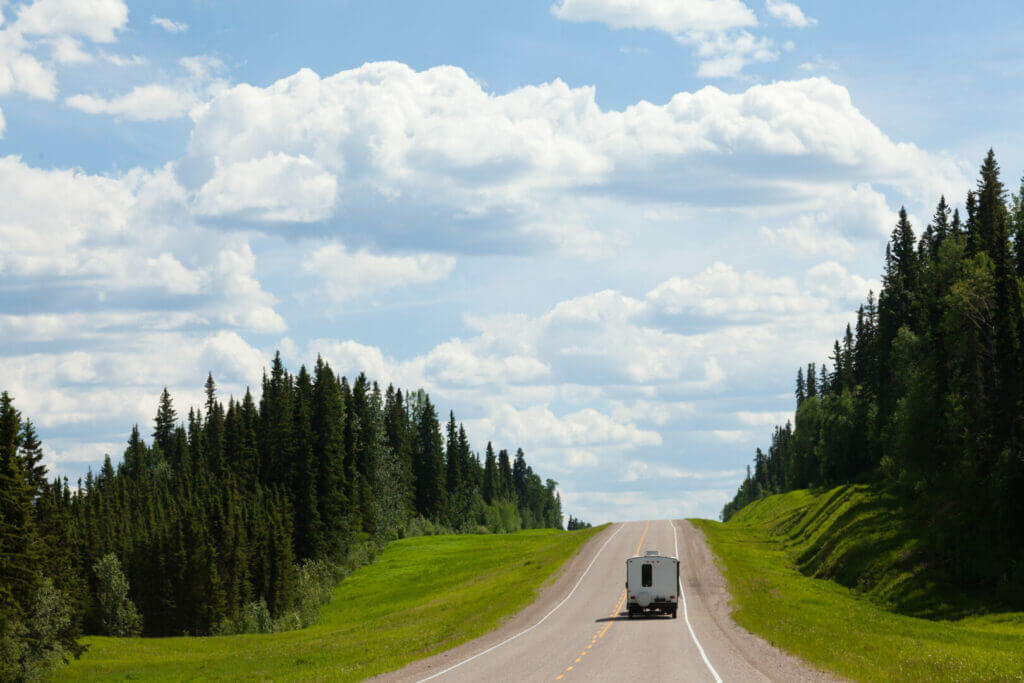
15. RV Insurance, Extended Warranties, and Roadside Assistance Can Be Expensive
RV insurance is necessary and could result in massive cost savings if there’s an accident. But it can also be expensive. Therefore, we recommend shopping around for insurance.
The same can be true for extended warranties and roadside assistance. Frequently, your RV insurance will include roadside assistance, so do your research and know the options before committing to any company.
Would You Enjoy RVing in Retirement?
So are you ready to RV in retirement? There’s a lot to consider. We’re certainly not trying to scare you off from the idea, but it’s helpful to be realistic about the multiple facets of the lifestyle.
If you’re seriously considering this lifestyle choice, keep researching and asking questions. Perhaps you want to rent an RV for a couple of weeks to get a little glimpse of what it might be like.
If you decide to RV in retirement, we’d love to hear about your experiences. Drop us a line!


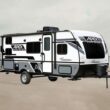


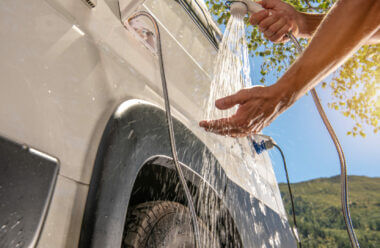

Timely article I just retired on Friday! Look forward to part time RV life. Thanks for the information
At first, I was leery about you 2 being so young as we are retired and 3/4 timers for almost 3 years now. However, what you wrote about make good sense. Keep up the great work and getting solid information out here!
Why would anybody want to purchase an RV after all those reasons. Thanks for the info.
I think this was a good article to give people a wake up call to RVing. Many people only see the positives and when a couple of the negatives pop up, they decide it’s not a lifestyle they want and take a massive loss on their RV and Tow vehicle.
We love RVing, but are not sure we could do it all the time and I hope you save some people a lot of money. Unfortunately, most people reading this already own an RV, hopefully we use the article to educate those thinking about it.
Cheers,
Bill
Our plan: bought a new 26′ TT with private bedroom. 5 years before I retire. In 5 years we should know where we want to take it – full time, weekend warrior or say goodbye and rent one occasionally. It may be an expensive test drive – but in 5 years if we have to love it, leave it or trade up, I believe it’s a test drive we have to take. Less expensive than buying a motorhome and finding out it’s not for us!
Hi John,
That is basically what we are doing as well. We had to go bigger than we wanted based on family size and to ensure we did not get off on the wrong foot based on the trailer being to small for our current family size. The 5 year test drive is going well so far, hope it is for you as well.
Great article, NOT!
Certainly not supporting RVing.
We full-time RVed for 7 1/2 years (2013-2020) in our 43-foot Winnebego motorhome and loved seeing the country. We visited all 50-states, Canada and Mexico during those 7 1/2 years. We especially enjoyed driving to Alaska and back, twice. Sure there a few breakdowns, but you roll with it. When we first retired, we stayed home, but it was boring seeing all the people leave for work in the morning. It’s not for everyone, but if you decide to RV, do it while you’re healthy. We know several couples who kept putting it off and then they couldn’t because of health issues.
What a buzz kill!
We are full time RV’ers and glad we did it and don’t look back.
A few things:
Of course we know that RV’s depreciate, just like a car – if you drive it off the lot all shiny and new, of course you take a plunge, but if you look at something in the couple of years old (just like cars) you can find the sweet spot. Besides, when you go on vacation (flying, resorts, cruise ships, etc) what is the return on that ROI? Hmmm…
Yes, you need insurance and coverage, just like anything else.
My husband and I are in a unique situation that we have worked and lived on boats for years (until retirement – yeah!) so we are used to small spaces. We actually call our coach our “land yacht” 😉
We have found that being on the road and meeting other likeminded RV’ers has made us more of a community instead of being isolated.
We do have the Thousand Trails membership (staying 2 weeks at each location) and it is well worth it.
I could go on, but just wanted to share a few thoughts from the other side. Thanks for listening!!!
BTW – Harvest Host Rocks, we love them
nice article covering the down side of tv’ing, but I didn’t see anything that was related to retirement the information provided was relevant to everyone. happy trails
Everyone please read this and do not buy an RV. That way I can continue to enjoy my life on the road.
After living the dream for the past five years and RVing four of them, fortunately none of your reasons have been an issue. Go ahead and discourage others but it has been epic for me!
At first glance I thought maybe I could garner some good info, sadly not, I am 70 years old and have been Rving since 1991, and have been full timing for the last 5 yrs, every body should know that like a house you have repairs, as do Rvs. it might be that you should maybe talk to some of the old timers, then give the advise, most of which you gave I disagree with. Thats my opinion,
from a long time Rver
RVing is a lifestyle choice. Going into it without research is foolish. If you want a simple responsible free, drama free life have your children put you in a nursing home.
njoyed this well-written, thought-provoking article. We have been full-time RVers for the nine years since retirement and, as noted in the article, it’s a definite learning experience. We had several points in our favor that made our decision easier and, I believe more assured of being a successful one:
* we had tent camped with and without hookups for more than 15 years.
*we bought a pop-up camper and used it for about two months a year for 9 years prior to retirement to see if we liked the lifestyle. This included several two-week trips from Florida to upstate New York, Vermont, and New Hampshire, some with and some without hook-ups.
* The year prior to retirement we bought our first travel trailer and got used to that with as many trips as we could.
* Once we retired, we had two six-week trips arranged and in spite of following the suggestions for leaving your Florida home for an extended time, I wouldn’t advise leaving the thermostat set above 75° unless you have a dehumidifier with a drain. We had a house sitter for a couple years and by that time, we knew we loved the lifestyle and wanted to continue. We weren’t sure what we wanted to do with the house, but it was paid for and the real estate market was still sluggish, so opted to hire a property management company. Warning: do your due diligence – only one company out of the three local choices took care of evicting a problem renter and paying court and attorney costs. Granted, they charge a bit larger percentage, but they have a more vested interest in finding good renters.
We have had our share of difficulties during our nine years:
* two years in, we found soft spots in the floor and cracks in both sides of our (2 year old) travel trailer which entailed driving to the factory in Indiana, renting a storage unit, emptying the RV, and finding a place to stay for two weeks, and once the repairs were made, reversing the procedure.
* My husband had to have an unexpected surgery in a town we weren’t familiar with,
* he had pneumonia in another town
* our diesel tow vehicle died 30 miles away from camp and was in the shop for three weeks
* one park we were in flooded quickly and we had to evacuate without the travel trailer and all our possessions
* we’ve had reservations canceled because of floods, hurricanes, and covid.
As overwhelming as all those difficulties were at the time, between the internet, law enforcement officers, campground hosts and park rangers, you realize all of these things have happened to others before you. Take a deep breath, do some research, ask people around you. You’ll find there are amazing folks willing to go out of their way to help.
We’ve also learned to look for a reputable mobile RV repairman if we need a repair rather than taking our RV to a dealer, but expect that insurance may not pay the travel charge. At this point, we are happy to pay the travel charge and get a problem resolved quickly rather than wait months for a dealership to get around to it.
My main advice to any who are thinking about the lifestyle: make sure you and your travel partner are on the same page; read a book or two on full-time RVing, check out some blogs about it; rent an RV and take a couple of extended trips; expect some difficulties, and most important, if you’ve never driven something large or towed before, take some lessons.
If you’re prepared and open to rolling with the punches, it can be an amazing journey; if you’re not – it could be a nightmare.
As a avide rver a word of advice if ur this old complaining about a recreational activity, U PROBABLY BELONG IN SHADY PINES. PLEASE
I picked up my RV during covid. And found myself semi retired I call it my tiny house. I’ve been boondocking now for two years otherwise the RV life would not be affordable. I love love love My tiny house. I’m at home everywhere I go. I was already single and living alone so this just added the scenic beauty of the world to my lifestyle. Thanks for the tips always cool to learn new things about how to manage my new lifestyle
We did everything you have said not to in this post. We bought a brand new fifth wheel, retired, sold the house and most of our stuff then moved in to the RV full time. We are one year in. We planned for 3+years. We had been campers our whole married life. It’s definitely an adjustment. We are still adjusting as things change often. But we don’t regret our decision at all. We love the lifestyle and look forward to traveling as snowbirds for years to come.
I travel extensively for work and often live in an rv several months a year. The only issues I’m concerned with are #4, and #6, the others I have dealt with and don’t consider any of them a deal breaker.
Will be retiring in a couple of years, and still see the rv lifestyle as a viable option.